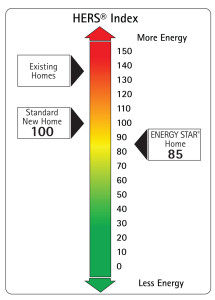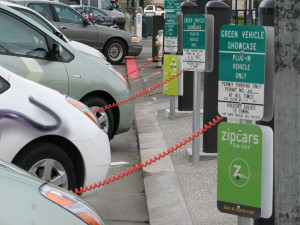 Sounds exciting, right? Well it is if you value efficiency in your life and believe that there are basic things we can do as human beings to decrease our footprint on this planet (oh yeah, and save money in the process). The vast majority of Americans will make the decision to buy their next car based on two numbers – the price tag and the Mileage Rating. Why should buying a home be any different? So I ask what’s hotter than a high performance car? A High Performance Home, of course.
Sounds exciting, right? Well it is if you value efficiency in your life and believe that there are basic things we can do as human beings to decrease our footprint on this planet (oh yeah, and save money in the process). The vast majority of Americans will make the decision to buy their next car based on two numbers – the price tag and the Mileage Rating. Why should buying a home be any different? So I ask what’s hotter than a high performance car? A High Performance Home, of course.
 A High Performance Home is exactly what it sounds like. A home that has been built or retrofitted to maximize efficiency and minimize long-term costs. New homes are required to meet certain efficiency standards and those that become certified are registered on resnet.org, and the Home Energy Rating Score (HERS 0-200) is the equivalent of the MPG sticker on your new car. Existing homes, with the help of a Dept of Energy approved Home Efficiency Audit receive a less complicated Home Energy Score (0-10). Both serve to tell you something about the efficiency of your home as cost of consumption is compared to energy use (or loss). Did you know that those ratings also have minimum thresholds that can qualify your home for an across the board increase in appraised value, when documentation is presented to the appraiser? Yes, it increases the value of your home. And banks are taking notice: there is tangible data from CoreLogic that homeowners living in energy efficient homes are 32% less likely to default on their loans, because they have more money left at the end of the month.
A High Performance Home is exactly what it sounds like. A home that has been built or retrofitted to maximize efficiency and minimize long-term costs. New homes are required to meet certain efficiency standards and those that become certified are registered on resnet.org, and the Home Energy Rating Score (HERS 0-200) is the equivalent of the MPG sticker on your new car. Existing homes, with the help of a Dept of Energy approved Home Efficiency Audit receive a less complicated Home Energy Score (0-10). Both serve to tell you something about the efficiency of your home as cost of consumption is compared to energy use (or loss). Did you know that those ratings also have minimum thresholds that can qualify your home for an across the board increase in appraised value, when documentation is presented to the appraiser? Yes, it increases the value of your home. And banks are taking notice: there is tangible data from CoreLogic that homeowners living in energy efficient homes are 32% less likely to default on their loans, because they have more money left at the end of the month.
So, does increasing your home’s efficiency make your home more valuable? Consider the following;
- Perform an Energy Audit – the process takes 2-3 hours and costs around $400.00. The efficiency experts will teach you all sorts of interesting things about your home. They will attach a huge fan to your front door, and figure out where your house leaks by sucking air through the various cracks and crevices. They will test your appliances, inspect your windows, squeeze into your attic and goof around in your basement. They will crawl through your home and make detailed recommendations that outline costs associated with making efficiency upgrades as well as anticipated savings to go along with them. The average home efficiency upgrade costs around $5,000 and increases efficiency in your home up to 23%, saving an average of $580 per year which is a 17% decrease in the total cost of ownership (which is defined as Principal, Interest, Taxes and Insurance (PITI) plus cost of energy). Taking it a step further by making more significant upgrades will run an additional $3-5000 and increase your total savings up to $1400 per year. Don’t think of it as an 8-year return on your investment. Think of it as savings starting in month one. It also may be the thing that differentiates your home from all the others on the market.
- If you are purchasing, consider an FHA Home Efficiency Loan – This allows a homebuyer to borrow up to $270,000 with only a 3% down payment. During the home inspection phase of the purchase process, the buyer must engage an approved efficiency expert to perform an energy audit. There is an excellent chance, if you live in Vermont, that there are Home Inspectors already certified to do this (there are). The lender will roll the cost of approved efficiency upgrades into the loan, with no additional down payment or qualification requirement on that money, and place the money in escrow to perform the upgrades. Your mortgage payments remain the same while your Total Cost of Ownership just went down by $100.00 per month. Thats real money.
 Selfie real estate – consider that Millennials and Gen Xers made up 59% of home buyers last year and that they have one very significant thing in common; as Generation X head toward retirement in the next 10 years or so and Millennials try and climb out from under a mountain of debt, they both place a premium on conservative numbers when it comes to the Total Cost of Ownership of their home. They are prioritizing fuel efficient cars, shorter commutes to work, and energy efficient homes. In other words, 59% of the buyers looking at your house next year will roll up in a Prius and ask to see your HERS rating. And then they whip out their smart phone and move onto the next house if they don’t like what they see.
Selfie real estate – consider that Millennials and Gen Xers made up 59% of home buyers last year and that they have one very significant thing in common; as Generation X head toward retirement in the next 10 years or so and Millennials try and climb out from under a mountain of debt, they both place a premium on conservative numbers when it comes to the Total Cost of Ownership of their home. They are prioritizing fuel efficient cars, shorter commutes to work, and energy efficient homes. In other words, 59% of the buyers looking at your house next year will roll up in a Prius and ask to see your HERS rating. And then they whip out their smart phone and move onto the next house if they don’t like what they see.
Whether your are an energy nerd or not, efficiency in your homes is not an issue that is going away any time soon. The home efficiency business is a game changer in the real estate market. You can get on board or get left behind, but the train is moving whether you are on it or not.
 Recently Sold
Recently Sold